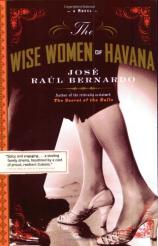Reading Group Guide
Discussion Questions
The Wise Women of Havana

1. Why did José Bernardo set The Wise Women of Havana before the revolution? How does this affect the style of his writing? Is he nostalgic or critical or both?
2. Throughout the novel Bernardo places a lot of emphasis on the lush, tropical climate of Cuba. Does this influence the way his characters behave?
3. In the world of pre-revolutionary Cuba, what roles do men and women play? Are they truly unequal or just apparently so? If unequal, what accounts for their inequality? How does this affect the Latino family and society as a whole?
4. Human sexuality is a strong undercurrent of The Wise Women of Havana and Bernardo treats it openly and passionately. How does this affect the novel, the characters, and the world Bernardo has created in his book?
5. Throughout the novel Bernardo makes reference to the unwritten behavioral code of Cuban society, where revenge is the only way to deal with personal affronts. Does he approve of this code or does he propose changes to it? And if so, what might those changes be?
6. Though the rivalry between Marguita and Loló is established from the outset of the novel, the character of Dolores is equally as important -- though in an understated way. What role does she play in the novel?
7. When Marguita decides to eliminate the desire of revenge from her heart, does she do it at the request of Dolores? Does Dolores act as the instrument of Marguita's transformation or does Marguita decide on her own to make changes in her life?
8. The character of Loló has an innate naiveté and innocence despite her outward behavior. When in their final encounter Loló decides to lie to the father of her child and tell him that she is not pregnant, why does she do it? Does she become a sacrificial victim to the behavioral codes she lives by? Or does she break away from that code and act wisely?
9. Are the women in the novel "wise" or do they become wise? And if so, is it because of their knowledge or because of their experiences?
10. Who is the Eunuch? And the Unicorn? What is the significance of the Second Moon?
11. What role do men play in a novel entitled The Wise Women of Havana?
12. The older priest tells the younger one that "Happiness is a way of praying." What does he mean by that?
The Wise Women of Havana
- Publication Date: February 1, 2003
- Paperback: 336 pages
- Publisher: Harper Paperbacks
- ISBN-10: 0060936150
- ISBN-13: 9780060936150







